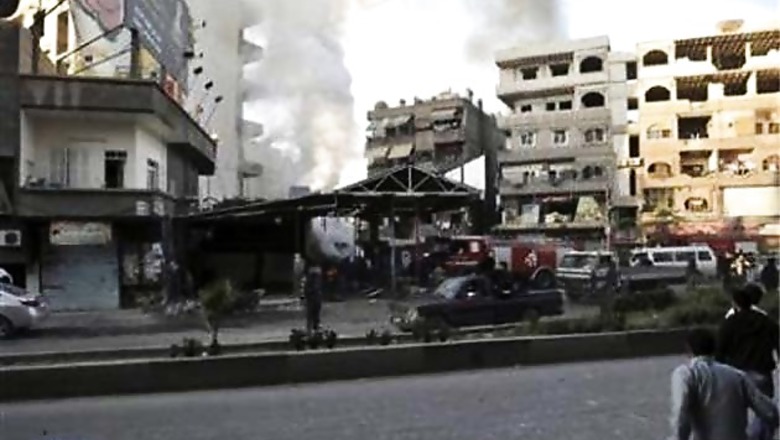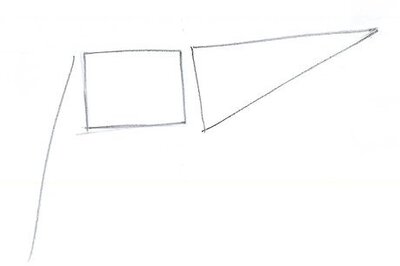
views
Beirut: Syrian rebels battled forces loyal to President Bashar al Assad just outside Damascus on Thursday, restricting access to its international airport, and the Dubai-based Emirates airline and EgyptAir stopped flights to the Syrian capital.
The Internet and some telephone lines went down across Syria. Rebels and the government traded blame for the blackout, the worst communications outage in 20 months of conflict.
Rebels fighting to topple President Bashar al Assad have been making gains around Syria by overunning military bases and have been ramping up attacks on Damascus, his seat of power.
A rebel fighter who identified himself as Abu Omar, a member of the Jund Allah brigade, told Reuters that insurgents fired mortars at the airport's runways and were blocking the road linking it with the capital.
Speaking from the scene of the fighting, he said insurgents were not inside the airport but were able to block access to and from it.
A spokesman for rebels' Military Council in Damascus, Musaab Abu Qitada, said an artillery round was fired at a military site inside the airport and that fighting was now less than a kilometre (mile) away from the complex.
"We want to liberate the airport because of reports we see and our own information we have that shows civilian airplanes are being flown in here with weapons for the regime. It is our right to stop this," he told Reuters on Skype from Damascus.
Two Austrian soldiers in a UN peacekeeping force deployed to monitor the frontier with the Israeli-occupied Golan Heights were wounded when their convoy came under fire near Damascus airport, Austria's defence ministry said. Syria state television said the soldiers were wounded by gunfire when rebels attacked an army position near the airport road.
The Information Ministry later said the highway to the airport was safe after security forces cleared it of "terrorists". Rebels said fighting in the area was continuing. The ministry said the airport was operating regularly, but there were no flights scheduled to land in the evening.
The accounts of fighting could not be immediately verified because of tight restrictions on media access to Syria.
But many airlines had already halted flights. Emirates suspended daily service to Damascus "until further notice". EgyptAir also said it was suspending all flights to Damascus because of "the deterioration of the security situation" there.
An EgyptAir flight that left at 1.30 pm (1130 GMT) landed in Damascus on schedule but the pilot was instructed to take off straight back to Egypt, airport sources in Cairo said.
INTERNET, PHONE LINES DWN
Residents said the Internet in Damascus crashed in the early afternoon and mobile and land telephone lines were functioning only intermittently.
A blog post on Renesys, a US company which tracks Internet traffic worldwide, said that at 12.26 pm (1026 GMT), the entire country's Internet connectivity shut down completely.
The government has been accused of cutting communications in previous assaults on rebel-held areas in Syria. Syria's minister of information said "terrorists" were responsible for the Internet shutdown, while the telecommunications minister blamed what he said was a fault in the main communications network.
The past two weeks have seen rebels seizing a series of army bases across Syria, exposing Assad's loss of control in northern and eastern regions despite the devastating air power that he has used to bombard opposition strongholds, killing dozens of civilians as well. More than 40,000 people have been killed since the uprising began, according to opposition groups.
Rebels and activists said the fighting along the road to Damascus airport, southeast of the capital, was heavier in that area than at any other time in the conflict.
"PREPARING FOR MAJOR BATTLE"
Nabeel al-Ameer, from the rebel Military Council, said a large number of army reinforcements had arrived along the road after three days of scattered clashes ending with rebels seizing side streets to the north of it.
He said he hoped the proximity of the rebels to the airport would dissuade authorities from using it to import military equipment, but the priority now was to block the road.
There are several military airports around Damascus that remain under government control.
A Syrian security source told Reuters on condition of anonymity that the army had started a "cleansing operation" in the capital to confront rebel advances.
The source, who is from Assad's elite 4th Armoured Division, said one of the aims of the operation was to seal off the suburbs - where rebels are dominant - from the city centre.
Assad is fighting an insurgency that grew out of peaceful demonstrations for democratic reform but has escalated, after a military crackdown on protesters, into a bloody civil war.
Syrian warplanes on Thursday bombed Kafr Souseh, Douma and Daraya, neighbourhoods that fringe the centre of the city where rebels have managed to hide out and ambush army units.
Activists said the areas were taking one of the heaviest poundings they had seen in months.
A senior European Union official said that Assad - whose family has held power in Syria for 42 years - might be preparing for a military showdown around Damascus by isolating the city with a network of checkpoints.
"The rebels are gaining ground but it is still rather slow. We are not witnessing the last days yet," the official said on condition of anonymity.
"On the outskirts of Damascus, there are mortars and more attacks. The regime is thinking of protecting itself ... with checkpoints in the next few days ... (It) seems the regime is preparing for major battle on Damascus."
WARY BIG POWERS
Most foreign powers have condemned Assad but stopped short of arming rebel fighters as they fear heavy weapons could make their way into the hands of radical Islamist units, who have grown increasingly prominent in the insurgency.
Rebels decry their supporters for not providing them with surface-to-air missiles that they say they need to counter the air force. But recent looting of anti-aircraft missiles from army bases, as well a slow stream of such weapons believed to be coming from Gulf Arab adversaries of Assad, has allowed them to shoot down some helicopters and jets.
"So far, there is no evidence that any of the surface-to-air missiles used to date have come from outside Syria," said Peter Bouckaert, emergencies director at Human Rights Watch.
"The limited number of surface-to-air missiles that have shown up all appear to have come from Syrian military stock captured by the armed opposition."
He said the number of these missiles in rebel hands was probably over 20 but could rise significantly if rebels continue to capture military bases.
The relatively small number of anti-aircraft missiles looted so far means that many rebel-controlled areas of the country remain vulnerable to air strikes. The Observatory said 15 citizens, including children and women, were killed during a bombing in Aleppo's Ansari district on Thursday.
Activist video footage showed the bodies of at least four children, wrapped in red blankets and apparently wearing pyjamas. Another video showed the immediate aftermath of the attack, with the bodies of children in the street and covered in cement dust. Half of one young boy's head was missing.














Comments
0 comment